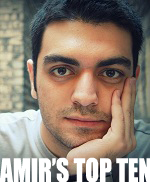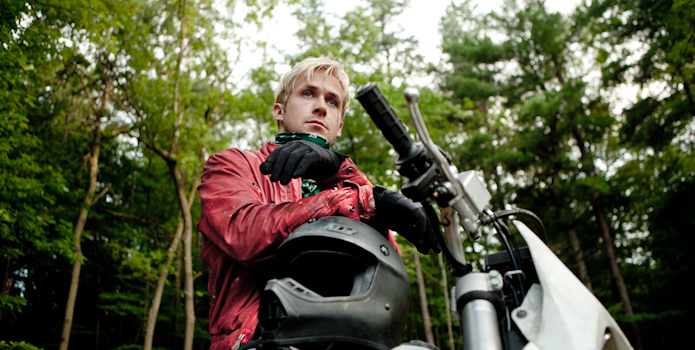 Amir here. Nathaniel has invited TFE contributors to share their top ten lists along with his own. Drawing up this list is a real dilemma every year. Not that I’m under the illusion that a list like this bears any significance on my personal affection for the films I leave out, but I still want it to be representative of the whole picture. This year was particularly tough. It’s been a terrific year for cinema, possibly my favorite since 2007. Even with five honorable mentions I still couldn’t find room for Moonrise Kingdom, Queen of Versailles, Silver Linings Playbook, The Grey, Damsels in Distress, Anna Karenina and so many others that I thoroughly enjoyed. But these lists are never definitive. Ask me on a different day and I might give you a whole different set. At this moment, this is where I stand.
Amir here. Nathaniel has invited TFE contributors to share their top ten lists along with his own. Drawing up this list is a real dilemma every year. Not that I’m under the illusion that a list like this bears any significance on my personal affection for the films I leave out, but I still want it to be representative of the whole picture. This year was particularly tough. It’s been a terrific year for cinema, possibly my favorite since 2007. Even with five honorable mentions I still couldn’t find room for Moonrise Kingdom, Queen of Versailles, Silver Linings Playbook, The Grey, Damsels in Distress, Anna Karenina and so many others that I thoroughly enjoyed. But these lists are never definitive. Ask me on a different day and I might give you a whole different set. At this moment, this is where I stand.
Honorable Mentions
We don’t get to see films as unique and original as Beasts of the Southern Wild very often so it pains me to leave it off. It moved me to tears and its images are etched in my memory all these months later. Magic Mike was a real highlight, a fully realized screenplay that dug beneath the flesh of its stars to explore universal themes and it had a few career-best performances to boot. As a big documentary buff and in such a banner year for the form, I find myself surprised that no doc made it to the top ten but three of my favorites were left just off: Sarah Polley’s brave and engrossing Stories We Tell in which the young Canadian filmmaker had the audacity to reveal the deepest secrets of her family through her poetic vision; Searching For Sugar Man, where the incredible story of a gifted, but largely unknown artist takes a twist that is as heartbreaking as it is heartwarming; and The Gatekeepers, an unprecedented exposé of the politics of the Israel-Palestine conflict and undoubtedly the most important film of the year.
10. The Place beyond the Pines
The unsuspecting audience entered the TIFF screening of this film with nothing more than a single image and a one-line synopsis to guide their expectations. Was it a genre piece as the minimal promotional material suggested or was it another emotionally charged drama like Derek Cianfrance’s last film, Blue Valentine? Plenty of both is the answer. Balancing tense, white-knuckle action sequences shot through Sean Bobbit’s masterful lens, with two gut-wrenching father-son stories, Pines is one of the most rewarding film experiences of the year. The bold twist at the midpoint of the narrative is handled so confidently, it surely cements Cianfrance’s position as one of the most promising talents in American cinema but the main talking point is elsewhere: Dane DeHaan’s star-making turn is as good a performance as any I’ve seen this year.
9. Lincoln
Built on the erudition and humor of Tony Kushner’s wondrous screenplay and bolstered by an impeccable, heartfelt performance from one of the greatest living thespians, Lincoln is Steven Spielberg’s best film in at least a decade. I dreaded the prospect of a biopic of America’s most beloved president directed by him, but there are no signs of his frequently schmaltzy sentimentalities. This is the work of a master at his very peak.
8. Much Ado About Nothing
Much has been written about the successful year Joss Whedon has had with the double punch of The Avengers and Cabin in the Woods. As someone who felt ambivalent about the former film and totally put off by the latter, such claims baffled me but it turns out he had more tricks up his sleeve. His experimental, semi-modernized adaptation of my favorite Shakespeare is shot in his own California mansion and brings together many of his regular cast members. They might sound like an odd match for the English playwright, but Whedon feels right at home. This woozy, poignant film captures the beauty of Shakespeare’s language without losing touch with a modern audience. It is also without a shred of doubt the funniest film I’ve seen in this young decade.
7. Amour
As formally rigorous as any other film in Haneke’s oeuvre, with the bonus addition of a beating human heart. It’s a testament to the power of cinema and the skill of Haneke as a director that such a simply constructed film, set entirely within the confines of one apartment and concerning only two elderly Parisians, transcends its limits to tell a universal story about love, life, mortality and morality. In many ways, Amour is a very different film from everything the Austrian maestro has done in the past, but it may well become the defining film of his career, and with good reason.
6. Beyond the Hills
Cristian Mungiu’s follow-up to 4 Months, 3 Weeks and 2 Days is, in my opinion, the most unfairly criticized film of the year, precisely because it is Mungiu’s follow-up to that grand masterpiece. But that direct comparison is reductive for the latter film, which is in its own right an immaculately designed, superbly directed and provocative look at religion’s redemptive and demonizing powers.

5. Zero Dark Thirty
It’s unfortunate that the debates surrounding the depiction of torture clouded over all discourse about this film, because Zero Dark Thirty is, first and foremost, a triumph of journalism on screen. It’s a film that holds back from commentary – even as subtle as what The Hurt Locker offered – leaving the interpretation entirely to the audience. Instead, Bigelow, with the help of an incredibly smart performance by Jessica Chastain, meticulously maps out the generally mundane process of finding the world’s most wanted man with panache and in gripping fashion. As a cinematic achievement, Zero Dark Thirty will be appreciated more and more as the heated political debates cool down.
4. After Lucia
An economical and sharply edited feat of storytelling, with a haunting ending that will painfully linger in my memory forever. When I interviewed the director of After Lucia, Michel Franco, I called the film the equivalent of being subjected to the Ludovico technique. I stand by that claim but I’d like you to think of it as a wholehearted endorsement for this brutally honest depiction of bullying in a Mexican high school. Franco’s unflinching gaze makes the audience restless but inescapability is exactly why the film succeeds.
3. The Master
It was only on the second viewing that it became clear to me what a unique and powerful experience Paul Thomas Anderson’s newest film is. It has become the American auteur’s most divisive work, but if any film deserves multiple visits and reconsideration, it is this one. The Master is about many things: an exploration of sexual repression, blind faith, religious fundamentalism, post-war America’s malaise, self-control and self-doubt. It asks many questions but forces us to search for the answers. But above all, it’s a profoundly layered film about the universal quest of man to learn to live without a master.
2. Frances Ha
The most joyous experience I’ve had in a movie theatre this year and certainly the high point of both Noah Baumbach and Greta Gerwig’s careers. Frances Ha is an energetic and rich portrayal of a generation that is too often misrepresented in American cinema. What we see on the screen is a cleverly calculated character study that plays to the strengths of Gerwig. Her off-kilter humor and flawless characterization of the endearingly clueless Frances shape one of the best performances of the year.

1. Tabu
Four visits and countless hours of obsessing later, I’m certain that Miguel Gomes’s magical, entrancing ode to cinema is my favorite film since Pedro Almodovar’s Talk to Her and the only film this year that I’m willing to throw the coveted M-word at with no reservations. The first half of the film is a testing, absurdly comic and technically impressive exercise that keeps the audience guessing but it’s the second half, gorgeously shot on 16mm, that has truly taken hold of me and never let go. At once a delicate, poetic exploration of romance and an allegorical take on the side effects of colonization, Tabu embodies everything I love about cinema. Every one of its elements – the crisp cinematography, the enchanting music, the moving performances – is near perfect and yet, the whole is still better than the sum of its parts.
